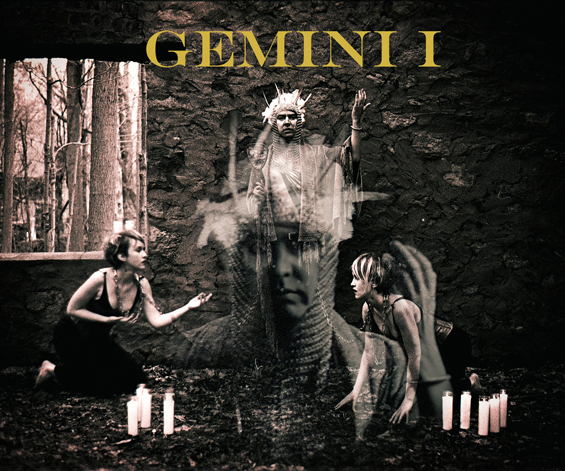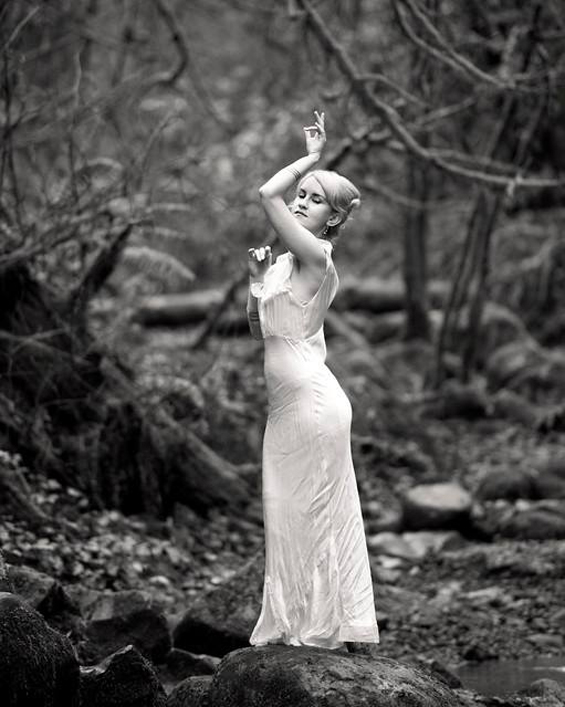

FIVE QUESTIONS WITH JOHANNA WARREN
These are busy times for Johanna Warren, what with a new album to promote, gigs to play, and a nascent label with a roster of artists to manage. But they're exciting times, too, considering that the Portland, Oregon-based artist and Spirit House label-runner has just issued her own exceptional Gemini I collection (reviewed here) while at the same time overseeing the preparation of releases by Vellum, Forest Veil, Lola Kirke, and others. textura is sincerely grateful to Johanna for finding time to talk with us about her new album, the Spirit House imprint, and other matters.
1. The singer-songwriter genre (and I hope you won't be offended when for simplicity's sake I include you in the genre) has such a long-established history and is so heavily populated. What is it about what you're doing that separates you from others?
Ha-ha, no offence taken ... I think it's curious that “singer-songwriter” should carry any connotations other than “a person who writes songs and sings them.” It's like saying, “I'm a guitarist”—well, cool, what kind of music do you play? I get it that the term has accrued some crappy coffee-house stigma, and I've been exposed to the reality of where that comes from, but there are plenty of amateur bros shredding inside Guitar Centers across the globe right now who haven't (entirely) ruined the term “guitarist” for the rest of us ...
So, to answer your question, I think it's kind of weird and silly that “singer-songwriter” is a genre in the first place, but as it is, I don't think anything I do separates me from others in that genre, as it is so broad. I'm proud to be standing under the same umbrella as Joni Mitchell, Sufjan Stevens, Carol King, Paul Simon, Elliott Smith, Buffy Saint-Marie, Leonard Cohen, etc., all of who have created their own singular musical universes while writing songs and singing them.
2. Though many things stand out in your music, your bewitching voice is certainly at the top of the list, especially when you demonstrate such exceptional control over your delivery. Was that developed through formal training or is it something with which you were born?
Neither. I definitely came out with a natural love for singing, but getting to know my instrument has been a long process of experimentation and curiosity. I've taken a couple of one-off vocal lessons here and there for various reasons, like one year when I was touring strenuously and worried I was destroying my vocal cords, but mostly I've developed my technique by singing in private environments where I feel able to take risks (e.g., my car), and singing all different kinds of music. I've definitely learned a lot by singing along with recordings and either harmonizing or trying to mimic the sounds as closely as possible, even other instruments—it's like the equivalent of an art student copying paintings by the great masters.

3. The songs on Gemini I strike me as some of the best examples I can recall of words matched to music and vice-versa. Did you tailor the arrangements subsequent to writing the lyrics or do your songs come into being in their whole form, and did you set out to create a specific narrative arc for the album's songs? How do Gemini I and its scheduled follow-up Gemini II relate to one another, and when will the second part be released?
Thank you; that's good to hear. I go into the studio with just guitar, lyrics, and vocal melody (generally what I perform live), and the arrangements all come together organically in the recording process. The mysteries of the creative process never cease to blow my mind—for me, there's a lot of fumbling around in the dark, going by feel, up ‘til the very the end when you turn the lights on and step back and think, “Wow, it almost looks like I knew what I was doing the whole time...”
As far as the concept and structure of these two albums goes, this body of work is definitely the most autobiographical thing I've ever made; all the songs came out of a very challenging, very beautiful relationship I've been in for two-and-a-half years. My partner is a Gemini, as is my Tarot Card reader, who has helped me process a lot of the heavy stuff that's come up in our relationship.
Initially I went into the studio with nothing but a chaotic heap of twenty songs. The concept all came together as I was recording, over the course of three insomniacal nights where as soon as I laid down my brain felt electrified with esoteric geometries, pulling this thing together: twin albums about the dance of polarity as embodied by the Lovers; each song has a twin on the other album; with two of the twenty songs discarded, each album has nine songs. Plus 9 = 3 x 3: Gemini is the third symbol in the zodiac; this is my third album; and there are three figures (man, woman, Angel/Devil) in the Lovers Card and the Devil Card. In the Thoth deck, Gemini corresponds with the Lovers, while my sign, Capricorn, corresponds with the Devil, and these songs are essentially about the Angels and Demons we summon, the Heavens and Hells we co-create; finally, structure each album in three groups of three so that one in every three represents an Angel or a Devil and the other two represent the attending mortal pair ... and Gemini II will be released next summer!
4. You've cited Joni Mitchell, Elliott Smith, and Nick Drake as major influences. In what ways do they specifically emerge in your music, and where on the album would you say their influence is audible?
All three greatly influenced the way I approached the guitar, by encouraging me to explore alternate tunings and unusual finger-picking patterns. I never even try to think about what chords I'm playing; I relate to my guitar as an abstract, intuitive playground made of shapes and colours and feelings. Elliott has always been my number one production reference for my solo project because his recordings are so intimate and psychological—it's like he's singing inside your head; there's no distance between you and him. That's the kind of experience I want to give listeners, too. On Gemini I, “circlenot astraight” sounds to me pretty directly derivative of the piano ballads on Blue.

5. How big an impact did the enhanced studio options offered by Dreamland, a studio in Woodstock, NY, have on Gemini I? Finally, what made you decide to found Spirit House, and what other releases will we see appear in the near future?
Working in a world-class recording studio was a total game-changer. The previous two albums my engineer Bella and I have made were recorded in just a few days in makeshift home studios with extremely limited resources. This time around, the sounds we got right off the bat (thanks to luscious vintage microphones and top-notch preamps) were as good as what we ended up with after mixing our previous records. Bella is such a genius, she can make pretty much anything sound awesome, but having such pristine sounds on the way in drastically cut down on the time we had to spend mixing. It was also the first time we've had easy access to a diverse assortment of instruments to play with, so the Gemini sessions were the first time I've ever gotten into playing electric guitar, bass, drums, synths, and percussion, and that was really fun and empowering.
Spirit House is largely a tribute to my late great friend Jonathan Nocera, my partner-in-crime in a band called Sticklips, who started a visionary record label called Proliferate Music. He was my hero, he changed my life in so many ways, and he had such passion and ambition around that project, but he never got to do much with it because he got a brain tumor and died at twenty-five. I saw him the night before he passed, and he told me he was leaving the label to me; he made me promise to never give up. That was almost four years ago, and it's taken me this long to find the drive within myself to do his vision justice in my own authentic way.

I launched Spirit House when I did because I was tired of waiting around to get picked up by a bigger label and essentially given permission by dudes in suits to exist. I shopped Gemini around to quite a few labels, and the response I got across the board was “We can't sell this.” That was discouraging for a minute, until I looked around and realized that I was sitting in the middle of a glistening web of beautiful witches who are making what I think is some of the best music I've ever heard and are facing similar impasses in the “industry”—not to mention that I've been carrying around this inheritance from my friend for years, feeling guilty and off-kilter for not embracing my destiny. Everything felt so aligned and supported, there wasn't much of a choice to be made.
October 2016![]()